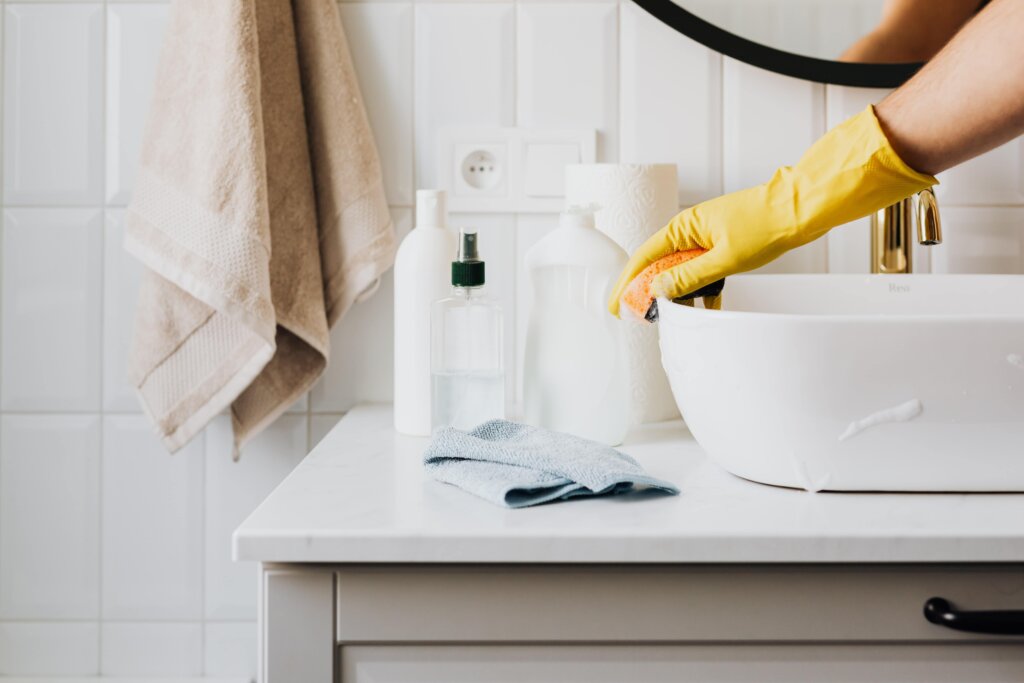What should you know when you’re selling a House during a pandemic?
The housing market in the United States bucked fears of a meltdown and instead surged in 2020 and 2021, propelled by record low borrowing rates, robust demand, and inadequate supply. Many sellers have stayed there, foregoing high sales prices in order to ride out the epidemic in familiar surroundings.
It is appropriate to assess the impact of the outbreak on real estate activities on a local scale. That includes thinking about best practices for selling, displaying, and buying a house in these difficult circumstances. If you’ve been considering selling your house, you still have time. Here is what you need to know about selling a house during a pandemic crisis.

Essential Tips for Selling a House During a Pandemic
Selling a house during a pandemic requires a well-thought-out approach, especially with the ongoing uncertainties surrounding COVID-19 regulations. Adapting to the evolving rules and restrictions is essential for ensuring a smooth transaction process. While initial stay-at-home orders and mask mandates may no longer be universally applied, some regions still enforce precautions, particularly in response to new variants like Omicron and fluctuating infection rates. Sellers must consult their realtors to remain updated on these guidelines, which can vary greatly between states and municipalities. Proactive collaboration with listing agents can help determine the most appropriate safety measures for showcasing homes in compliance with local regulations.
In addition to adhering to health-related restrictions, sellers must adopt innovative strategies to address the unique challenges posed by the pandemic. For example, leveraging technology for virtual home tours has become indispensable. Virtual tours allow buyers to explore properties remotely, offering an immersive experience without compromising safety. These tours can be enhanced through proper staging, lighting, and user-friendly software, ensuring the home’s best features are highlighted effectively. Sharing these tours through social media platforms and real estate websites can also broaden the reach, attracting potential buyers who may be unable or hesitant to visit in person.
Another practical approach is embracing digital solutions for closing transactions. Remote closings streamline the final steps of selling a house, allowing parties to sign documents and transfer funds securely from their respective locations. Platforms like Qualia provide features such as e-signatures, video conferencing with notaries, and integrated payment systems, simplifying the process while minimizing face-to-face interactions. Sellers should ensure they are familiar with these tools and consult their realtor or attorney for guidance on implementing them.
Safety remains a top priority, and sellers can take additional measures to reassure potential buyers. Preparing “display kits” for property showings is one such method. These kits can include items like masks, gloves, hand sanitizer, and shoe coverings, encouraging visitors to adhere to health precautions. Sellers should also sanitize high-contact areas such as doorknobs, countertops, and light switches before and after each showing. Transparency in communicating these efforts demonstrates a commitment to public health, creating a positive impression on prospective buyers.
Flexibility is another critical aspect of selling a house during a pandemic. Delays in inspections, appraisals, and closings are common due to travel restrictions or illness. Sellers should anticipate these disruptions and adopt proactive solutions, such as requesting virtual appraisals and using electronic document signing to maintain momentum. Collaborating closely with their realtor and maintaining clear communication with all parties involved is vital for navigating these challenges successfully.
Furthermore, avoiding open houses is advisable during a pandemic to reduce the risk of large gatherings. Private showings, combined with virtual tours, offer safer alternatives while maintaining buyer engagement. Sellers should limit the number of attendees, ensure visitors wear masks, and sanitize the space after each appointment. These practices reflect adaptability and responsibility, qualities that are particularly appreciated in uncertain times.
In conclusion, selling a house during a pandemic demands a blend of innovation, diligence, and flexibility. By embracing technology, adhering to safety measures, and maintaining open communication, sellers can navigate the complexities of the real estate process while prioritizing the well-being of all parties involved.
Selling a House During a Pandemic – How to do it?
1. Virtual home tour
Selling a house during a pandemic has revolutionized how properties are showcased, and virtual home tours are a prime example of these innovative approaches. With many prospective buyers unable to visit homes in person due to travel restrictions or safety concerns, investing in a high-quality virtual tour can be a game-changer. This digital solution not only allows buyers to view your property from the comfort of their own homes but also provides an immersive and accurate representation of the space. A well-executed virtual tour can highlight a property’s unique features, such as open floor plans, high ceilings, or custom details, giving potential buyers a comprehensive sense of the home.
Creating a standout virtual tour involves careful planning and attention to detail. Collaborate with your realtor to ensure that the property is properly staged, with furniture arranged to maximize space and visual appeal. Excellent lighting is essential for capturing clear and inviting images, so consider scheduling filming during the daytime or investing in professional lighting equipment. The right software also plays a crucial role; use platforms that offer seamless navigation and high-resolution imagery to give viewers an engaging experience. Once completed, these tours can be shared widely on social media channels, real estate websites, and email campaigns to reach a larger audience.
Moreover, virtual tours offer flexibility and convenience for both buyers and sellers. Interested buyers can revisit the tour at their leisure, exploring specific areas of the home in greater detail without the need to schedule multiple in-person visits. For sellers, this means fewer disruptions to daily life and a reduced need for extensive cleaning and sanitizing after every showing. This approach aligns perfectly with the safety measures and practical constraints involved in selling a house during a pandemic.
By adopting virtual tours, sellers demonstrate adaptability and forward-thinking, key traits in an ever-changing real estate landscape. These tours not only cater to the immediate needs brought about by pandemic restrictions but also reflect the broader trend towards digital transformation in the industry.
2. Participate in a remote closing
Selling a house during a pandemic has undoubtedly pushed the real estate industry to adapt and innovate, with remote closings standing out as a game-changing solution. These digital closings streamline the traditionally intricate process of finalizing transactions by allowing all necessary steps, from signing documents to transferring funds, to be completed without the need for in-person interactions. The utilization of secure platforms like Qualia ensures the legality and financial safety of these transactions while making the process more convenient for everyone involved.
The benefits of remote closings extend beyond convenience. They offer a practical solution for navigating the logistical challenges imposed by travel restrictions, social distancing, and lockdowns. By leveraging features like secure e-signatures, video conferencing with notaries, and integrated payment systems, sellers and buyers can meet their contractual obligations without compromising safety. These measures demonstrate how technology can address the demands of selling a house during a pandemic while protecting public health.
Adapting to remote closings also enhances the overall efficiency of the transaction. Delays are minimized as participants can execute required tasks from their respective locations, eliminating the need for scheduling physical meetings. This technological approach is particularly beneficial for individuals who are either at high risk or prefer to minimize exposure to crowded settings. By integrating these digital tools, sellers present themselves as resourceful and forward-thinking, qualities that appeal to modern buyers.
Moreover, the growing reliance on remote closings signals a shift towards a more flexible and accessible future in real estate. Sellers should work closely with their agents, attorneys, and lenders to understand the specific requirements and processes for implementing remote closings in their jurisdiction. Establishing clear communication with all parties ensures that potential issues are addressed promptly, contributing to a smoother transaction process.
In conclusion, selling a house during a pandemic demands adaptability and the willingness to embrace technological advancements like remote closings. By adopting these practices, sellers can navigate unprecedented challenges while prioritizing the safety and well-being of all parties involved.
3. Be prepared for delays
Selling a house during a pandemic demands flexibility and proactive planning to navigate unforeseen obstacles. Real estate transactions, already complex under normal circumstances, become even more challenging due to social distancing, travel restrictions, and other pandemic-related conditions. Delays in inspections and assessments are common, as scheduling professionals to evaluate the property can be more difficult in these times. Buyers and sellers alike must be prepared for disruptions, especially if illness or exposure to the virus requires confinement and recovery periods, potentially delaying the closing process.
In addition, sellers should anticipate the need for innovative approaches to mitigate risks and move the process forward. Virtual home tours, remote appraisals, and electronic document signing can reduce delays and maintain momentum while adhering to pandemic precautions. Collaborating closely with your realtor is essential to determine the best course of action, ensuring all participants remain safe while progressing the transaction effectively. Sellers may also encounter fluctuating market dynamics, as buyer preferences and demands evolve in response to pandemic-related uncertainties. Adapting to these changes, staying informed on local regulations, and maintaining clear communication with all involved parties are critical to a successful sale.
By staying adaptable and embracing technology, selling a house during a pandemic can be managed with resilience and creativity.
4. Provide display kits
Selling a house during a pandemic has prompted innovative strategies to ensure safety during property showings, including the use of display kits. For homeowners who need to stay in their property while it is on sale, assembling a “showing kit” is a practical way to reduce the risk of virus exposure. These kits can include essential items such as hand sanitizer, disposable gloves, masks, and shoe coverings, providing peace of mind to both realtors and potential buyers. Ensuring easy access to these supplies during showings encourages all visitors to adopt precautionary measures, minimizing the chances of contamination.
Beyond physical safety, the inclusion of display kits reflects an increased sensitivity to the pandemic-related concerns of prospective buyers, ultimately improving the overall viewing experience. For sellers, collaborating with their realtors to implement this thoughtful approach demonstrates a proactive and responsible effort to adapt to the current circumstances. Additionally, incorporating signage that reminds visitors to use these items or sanitize frequently further emphasizes the importance of public health measures.
These precautions, when paired with other strategies such as virtual tours and remote closings, showcase the resilience and ingenuity required for successfully selling a house during a pandemic. By adopting a combination of technology and safety-oriented practices, sellers can navigate challenges effectively while prioritizing the well-being of all parties involved.
5. Request a virtual appraisal
Selling a house during a pandemic involves creative adjustments, such as requesting a virtual appraisal to simplify the valuation process while adhering to safety protocols. Lenders typically require professional evaluations to ensure the property is worth the loan amount, but many are waiving the need for in-person appraisals to accommodate pandemic restrictions. By opting for a virtual appraisal, sellers can expedite the process and avoid unnecessary face-to-face contact.
To facilitate a virtual appraisal, you or your realtor must provide accurate and comprehensive details about your property. This includes precise measurements of both interior and exterior spaces and high-quality photos of every room, showcasing the condition of the home. Clear visuals that capture essential features such as flooring, cabinetry, appliances, and overall layout help the appraiser calculate an accurate valuation remotely. Providing detailed descriptions alongside these images further enhances the appraiser’s ability to make informed decisions.
Virtual appraisals not only offer convenience but also demonstrate a commitment to public health during the pandemic. This approach minimizes disruptions while maintaining the integrity of the valuation process. Furthermore, virtual appraisals can be shared digitally with all relevant parties, ensuring transparency and efficiency. Sellers should consult with their realtor for advice on presenting their property effectively, whether through staging, proper lighting, or selecting the best angles to highlight unique features.
By integrating this technology-driven solution, sellers can overcome logistical challenges and keep the transaction moving forward smoothly, even during uncertain times.
6. Consider e-offers
Selling a house during a pandemic has revolutionized traditional real estate practices, making e-offers a convenient and efficient solution. Typically, when a buyer makes an offer, their agent meets with them to finalize the details before delivering the offer to the seller’s agent, who then presents it to the seller. However, in these times, minimizing face-to-face interactions is essential.
To streamline this process, request that your realtor send you the purchase offer digitally. This allows you to review the terms in detail, preferably over a phone call or video chat with your realtor, to ensure you fully understand every aspect of the agreement. Once you decide to accept the offer, you can sign the official contract electronically or collect a physical copy from your letterbox, as arranged by your agent. After signing, your realtor can retrieve the document securely and continue with the next steps.
By embracing technology like e-offers, you not only ensure safety but also keep the transaction moving smoothly, even in unpredictable circumstances. This digital-first approach reflects the adaptability required for successfully navigating the challenges of selling a house during a pandemic.
7. Sanitize before and after
Selling a house during a pandemic requires a strong focus on health and safety. Even when rigorous precautions are in place, there’s no guarantee that visitors will be as diligent. To reduce risks, prioritize thorough cleaning before and after every property showing.
Pay close attention to high-contact surfaces, including faucets, light switches, doorknobs, countertops, drawer handles, and railings. Utilize disinfectants recommended by health authorities to eliminate germs effectively. For added protection, consider stocking cleaning supplies that visitors can use, such as sanitizing wipes and sprays, ensuring they have easy access.
Collaborate with your realtor to establish cleaning protocols and maintain transparency with prospective buyers. Inform visitors about your efforts to keep the space sanitized, as this thoughtful approach reassures them of their safety while showcasing your commitment to the well-being of everyone involved.
Adopting these cleaning habits reflects adaptability and diligence, essential qualities for successfully navigating the challenges of selling a house during a pandemic.

8. Avoid open houses
Selling a house calls for adjustments to traditional real estate strategies, and one of the most critical changes is avoiding open houses. Typically, open houses allow prospective buyers to explore a property freely without any immediate pressure. While this approach is an effective marketing tactic during normal times, it poses significant risks during an outbreak.
Open houses often involve a large number of visitors, creating challenges in maintaining social distancing and ensuring the safety of everyone involved. Additionally, some cities or localities may have specific restrictions in place, prohibiting gatherings or events that facilitate the spread of the virus. It’s crucial to stay informed about these regulations and adapt your selling strategy accordingly.
Instead of open houses, opt for safer alternatives such as scheduled private showings or virtual tours. Virtual tours, in particular, offer an immersive experience, allowing potential buyers to explore your home remotely. This not only prioritizes health and safety but also expands your pool of buyers by accommodating those who cannot visit in person. For private showings, limit the number of attendees, ensure they wear masks, and sanitize the space before and after each visit.
By steering clear of open houses and embracing innovative solutions, you demonstrate flexibility and responsibility—key traits for successfully navigating the challenges of selling a house during a pandemic.
9. Don’t tag along with the inspector
When selling a house, it demands heightened caution, especially during critical stages such as the home inspection. Typically, sellers accompany inspectors to provide context about the property, clarify any concerns, and point out unique features. However, in these circumstances, it’s best to avoid unnecessary close contact to minimize health risks.
Instead, leave a detailed note for the inspector if there are specific issues you would like addressed or explained. Include information about recent repairs, special features, or any factors that might influence their assessment. Prepare your house thoroughly, ensuring it’s clean, sanitized, and easy to navigate, and then evacuate the property like you would for a showing.
Additionally, coordinate with your realtor to address any follow-up questions from the inspector remotely. Phone calls or video conferencing are effective alternatives that allow you to clarify points without compromising safety. By adopting these measures, you not only protect yourself and others but also demonstrate responsibility and adaptability—key traits for navigating the challenges of selling a house during a pandemic.
By prioritizing safety and leveraging technology for communication, you can ensure the inspection process proceeds smoothly while maintaining health precautions during this crucial step in the sale.
10. Encourage hand washing
Selling a house during a pandemic requires creative approaches to ensure safety and success. Beyond virtual tours, remote closings, and sanitary precautions, emphasizing hygiene is a simple yet vital step. Hand washing is one of the most effective ways to reduce the risk of virus transmission, and its importance should not be underestimated in the context of real estate transactions. Sellers can proactively encourage this healthy habit by placing visible signs at the kitchen and bathroom sinks that promote thorough hand washing. These signs can serve as reminders for visitors to clean their hands properly, reducing potential contamination. Pair these signs with antiseptic hand soap and disposable napkins to facilitate the process and demonstrate consideration for public health.
Furthermore, sellers might consider creating sanitation stations throughout the property to provide visitors with easy access to hand hygiene products. Beyond its practical benefits, promoting hand washing reflects a heightened level of care and responsibility that can enhance the trust of potential buyers.
By making this effort, sellers not only protect their homes but also showcase their adaptability and mindfulness during challenging times. This thoughtful approach aligns with broader practices like sanitizing high-touch areas before and after showings and offering personal protective equipment kits to visitors. Together, these measures create a safer and more appealing environment, making the experience of selling a house during a pandemic less daunting.
The act of encouraging hand washing underscores the seller’s commitment to safeguarding everyone’s well-being, adding a layer of reassurance to an already complex process. Adaptation and innovation in both small and large measures can transform challenges into opportunities, ensuring a smooth and successful transaction even amidst a pandemic.
What You Should Know Before Virtually Signing Legal Documents
Selling a house during a pandemic necessitates understanding and adapting to evolving legal frameworks, particularly when handling virtual transactions. Isolation laws specific to your region’s circumstances can significantly influence the nature of standard commercial exchanges. In times of forced lockdowns, many jurisdictions introduce temporary measures to facilitate real estate processes through technology. These provisions may include allowances for virtual e-signing of contracts, electronic recording of deeds, and remote notarization services. Such adaptations aim to streamline property transactions and minimize disruptions despite physical distancing requirements.
It is crucial for sellers to actively engage with their realtor or legal advisor to discuss how digital signatures can be incorporated into closing and sale agreements. Your real estate agent or attorney can guide you through the specifics of implementing electronic solutions while ensuring compliance with regional regulations. Moreover, understanding the limits and legal ramifications of these practices is vital in protecting your interests throughout the transaction. For example, while digital signatures can expedite the process, ensuring proper security measures and authentication protocols is essential to safeguard against potential fraud.
The convenience of electronic documentation and remote notarization introduces notable efficiencies, but it also requires a degree of technological readiness. Sellers should ensure they have access to reliable internet connections, compatible devices, and secure platforms for exchanging sensitive information. Familiarizing oneself with these tools not only reduces delays but also positions sellers as adaptable and forward-thinking individuals capable of navigating challenges effectively.
Beyond technical preparedness, it is also wise to maintain clear communication with all parties involved, from buyers to lenders and escrow officers. Transparency in how virtual processes will be conducted reassures stakeholders and helps avoid misunderstandings. By embracing these modern solutions, sellers demonstrate resilience and innovation, qualities that are particularly valued in uncertain times.
Selling a house during a pandemic demands careful consideration of both legal and practical aspects to successfully manage virtual transactions.
Endnote
Selling a house during a pandemic is no easy feat, but with the right mindset and tools, it can still be done successfully. The real estate market has proven resilient, even thriving in certain areas, yet many homeowners remain hesitant to list their properties amidst the uncertainties of public health and economic stability. However, the real estate industry has risen to the challenge, relying heavily on technology and adapting traditional practices to meet the unique demands of a global crisis.
Technology has been a game-changer in this regard. Virtual home tours, remote closings, and digital documentation processes are now the norm, providing safety, convenience, and efficiency for both sellers and buyers. Virtual tours, for instance, allow potential buyers to explore homes from the comfort of their own spaces, eliminating the need for physical visits while maintaining an immersive experience. Advanced software platforms enable realtors to craft detailed, visually appealing tours that highlight a property’s best features, effectively attracting interest even when in-person showings aren’t feasible.
Remote closings further ease the stress of selling a house during these times. With secure platforms offering e-signatures, video conferencing, and integrated payment systems, transactions can be completed without any physical interaction. This technological shift not only accelerates the process but also reduces health risks, showcasing the industry’s ability to adapt and innovate.
In addition to leveraging technology, homeowners and realtors must also adopt stringent health and safety measures. Providing sanitization kits during showings, encouraging hand washing, and regularly cleaning high-touch surfaces are just a few examples of how sellers can make prospective buyers feel secure. Transparency in these efforts reflects responsibility and builds trust, qualities that are essential in fostering buyer confidence during challenging times.
Flexibility is also paramount when selling a house during a pandemic. Delays in inspections, appraisals, or closings are common due to travel restrictions, illness, or other unforeseen circumstances. By anticipating such challenges and working closely with all parties involved, sellers can navigate disruptions with minimal stress. Communication is key—ensuring that buyers, agents, lenders, and attorneys are all on the same page helps to avoid misunderstandings and maintain momentum.
Understanding market dynamics is another critical aspect. Buyer preferences may shift due to the pandemic, with many prioritizing homes with larger spaces, dedicated offices, or outdoor areas. Sellers should adapt their strategies accordingly, emphasizing features that align with these evolving demands. Staging the property to highlight its most attractive qualities and investing in professional photography for online listings can make a significant difference in capturing buyer interest.
Furthermore, sellers must be prepared for potential compromises. Economic uncertainty might influence buyers’ purchasing power, requiring sellers to negotiate more flexibly on pricing or terms. However, with the right approach, these compromises can pave the way for mutually beneficial outcomes.
Despite the challenges, selling a house during a pandemic has proven to be entirely possible. The real estate industry’s rapid adaptation to new norms and reliance on technology have enabled homeowners to succeed even in uncertain times. If you’re ready to take the leap, remember that safety, innovation, and flexibility are your greatest allies. We’re here to help, and if you’d like a free, no-obligation cash offer for your house—no listing fees, no stress—don’t hesitate to give us a call. Why not take the next step today?

